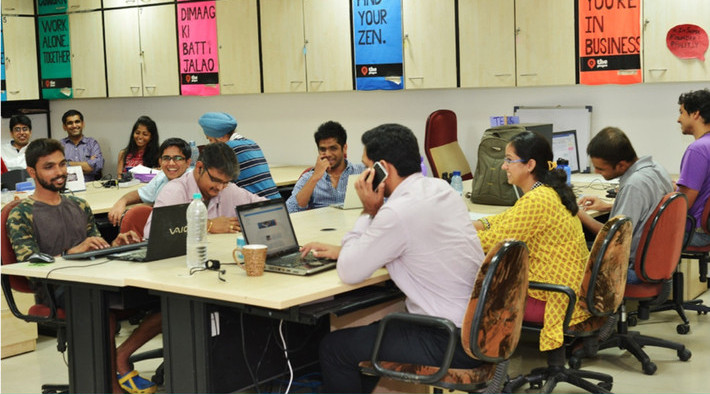Gargi Shah is the co-founder of one of Mumbai‘s first coworking spaces. When she opened The Playce in November 2012, the coworking concept was practically unheard of in India. Gargi spent many days dreaming up ways to explain what she did to her grandmother, who still believes that her granddaughter rents out offices for a living. The Playce has completed five eventful years – a proud home to creative, entrepreneurial and even outlandish co-workers.
We spent some time talking with her to get her impressions about running a coworking space in one of the biggest, densest and fastest developing city in the world.
We use to claim coworking is all about community. Some players say tenants just appreciate the flexibility and a convenient environment. How do you see it?

Gargi Shah
Coworking is NOT just about the community. Customers come with different goals. Some are looking for a productive office space, some are looking to find like-minded people, others for an affordable setup still, others choose coworking for the unprecedented flexibility it provides.
Coworking is NOT just about the community. Customers come with different goals.
Having a strong community in a coworking space makes the space attractive, but it is one of the many things that space offers. It can be one of the best ways to retain customers, especially teams.
Is Coworking just a smart Real Estate game?
Coworking is generally much more than simply a Real Estate calculation. There are community, flexibility, affordability and a host of other useful services offered to the customer.
That said, there are many cases where coworking is a way to leverage non-premium properties. In these cases, it starts with a smart Real Estate Game. The premise in question is typically not a premium property for a variety of reasons – location, floor plan, market conditions etc. This makes it tricky to rent out the entire premise to a single lessee.
The owners of such Real Estate premise have come to realise that coworking can give them a quick-fix to their rental requirements. Running a coworking space is a clever idea because the premise generates at least some revenue (even if it is less than market rent) instead of lying vacant. Coworking customers are looking for affordable workspaces even if it means that they have to compromise on certain other parameters. It’s a win-win for both the parties.
Mumbai is one of the biggest and crowdiest metropoles in the world. Coworking is booming. Is community less important in big cities?
The community is just as important in the big cities, perhaps even more so because the coworkers (entrepreneurs, startups, freelancers, etc) are working in a highly competitive market. They need all the support and encouragement they can get. It certainly helps them to know that there are others like them who are sticking their neck out for their idea. The support of the community and kindred souls is invaluable when an entrepreneur is starting out. 
The community is just as important in the big cities, perhaps even more so because the coworkers are working in a highly competitive market.
On the flip side, a coworker has many more options in a big city – cafes and restaurants (long the ‘offices’ of lone warriors), extra unused desks in traditional offices, apartments etc. This makes it harder for coworking spaces to retain customers.
How do we fill in coworking spaces in India?
India is rather diverse and most coworking spaces have their own niche offering. Some offer unbeatable prices, some offer creative interiors, some have simply located themselves in a high-demand location and some have an organic community built over a period of years. In Mumbai, there are diverse demographics who need a coworking space to suit different needs. It is mainly an overwhelming demand for flexible office spaces that drives the coworking market of Mumbai.
Most coworking spaces have their own niche offering. Some offer unbeatable prices, some offer creative interiors, some have simply located themselves in a high-demand location and some have an organic community built over a period of years
Fun, conviviality, learning, networking… Is it only for startups or Gen Y and Z?
Oh no, not at all. In all our workshops and events we have seen incredibly large participation from established freelancers and folks in their forties, fifties and even a few in their sixties. One would expect that startups and Gen Y/Z folks would be a big part of the fun and networking, but more often than not they don’t have the time and inclination to get out of their personal space and explore. They are buried in their startup challenges and personal journeys. It is the 30s and over a crowd that tends to have a more long-term perspective and are an integral part of the fun, learning and networking side of things.
One would expect that startups and Gen Y/Z folks would be a big part of the fun and networking, but more often than not they don’t have the time and inclination to get out of their personal space and explore
Join Coworking Europe Conference for more insights, data and connections!


